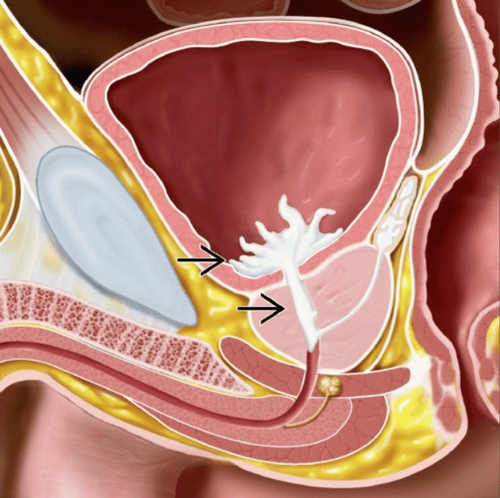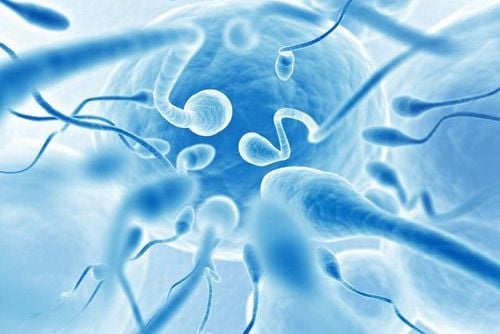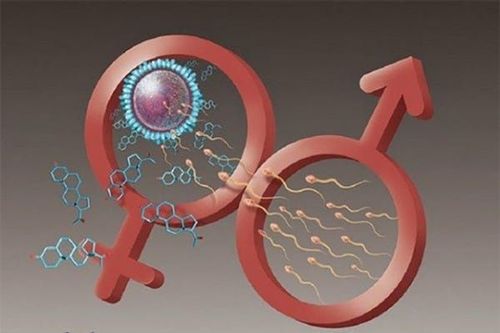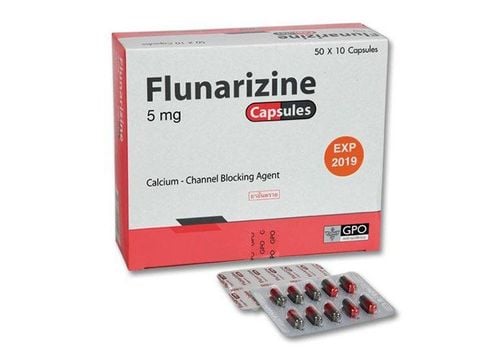Thin sperm is a condition that reflects a change in the quantity and quality of sperm, often raising concerns about male fertility
1. Why is sperm watery?
Semen is the fluid secreted from the male penis during ejaculation. This fluid contains sperm and fluids from the prostate and other reproductive organs. Normally, semen is a thick liquid and is white in color. However, several factors can alter the color and consistency of semen.
Watery sperm can be a sign of low sperm count, indicating that fertility may be affected. Watery sperm can also be a temporary condition that does not seriously impact health. There are several common causes of this condition, and most can be treated or prevented.
1.1. Watery sperm due to low sperm count
Low sperm count is the most common cause of watery sperm. The World Health Organization (WHO) defines oligospermia as having fewer than 15 million sperm per milliliter of semen. This condition can make conception more difficult but does not necessarily mean infertility.
The causes of low sperm count are not always clearly defined. However, some genetic conditions, such as Klinefelter syndrome, can affect a person's sperm count.
Other causes of low sperm count include:
- Varicocele: This is the enlargement of veins from the testicles to the scrotum. Usually, varicocele has no obvious symptoms but can reduce sperm production and affect sperm quality. Varicocele can occur in one or both testicles and is common in about 15% of men, with approximately 40% of men with fertility issues having varicocele. Around 80% of men with varicocele have no fertility problems.
- Hormonal disorders: These include hyperthyroidism and hypogonadism. The hormones produced by the pituitary gland, hypothalamus, and testicles are essential for the production of healthy sperm. Any changes in these hormones can affect sperm production.
- Infections: Infections in the reproductive organs, including sexually transmitted infections such as gonorrhea or epididymitis, can reduce sperm count.
- Exposure to radiation or toxins: This includes industrial chemicals, pesticides, and lead.
- Lifestyle: Drug use, heavy drinking, smoking, being overweight, or obese can also reduce sperm count and quality.
- Medications: Some medications can affect sperm production.
- Tumors: Both benign and malignant tumors in the testicles can affect sperm production. Other potential causes include:
Ejaculation issues:
- Retrograde ejaculation is one such condition.
- Antisperm antibodies: The immune system may produce antibodies against sperm.
- Trauma or other issues with the vas deferens Retrograde ejaculation can lead to low sperm count

1.2. Frequent ejaculation can cause watery sperm
If a person ejaculates frequently, such as through masturbation or multiple sexual activities in one day, the body may not have enough time to produce enough sperm with the usual quality.
In a study conducted in 2016, researchers tracked the daily ejaculation patterns for 14 days of 20 men after abstaining for 3-5 days. They collected and analyzed semen samples from these men on day 1, day 3, and day 14.
The researchers found that watery sperm was observed between days 1 and 3, returning to normal levels between days 7 and 14.
1.3. Watery sperm may be caused by retrograde ejaculation
Normally, during ejaculation, sperm travels through the urethra and exits through the penis. However, when the bladder sphincter is malfunctioning, sperm can be redirected into the bladder, leading to a condition called retrograde ejaculation.
People with this condition may produce fewer or more watery sperm than usual.
1.4. Zinc deficiency causes watery sperm
Zinc is an essential nutrient that supports many basic body functions, such as DNA synthesis, infection prevention, wound healing, and reproduction.
Zinc also plays an important role in producing healthy sperm and preventing watery sperm. According to a 2018 study published in the journal Reproduction and Fertility, zinc deficiency can contribute to reduced sperm quality and cause infertility. Conversely, too much zinc in the body can negatively affect sperm quality.
Because the body cannot produce or store zinc, we can only obtain it through diet. Some foods rich in zinc include:
- Oysters.
- Red meat, poultry, and shellfish.
- Nuts, seeds, and whole grains.
- Beans.
- Dairy products like yogurt.

2. Does watery sperm affect fertility?
Watery sperm is usually a temporary condition and can self-resolve. However, when semen liquefies quickly, it can sometimes indicate low sperm count or other health issues that may affect fertility.
Low sperm count does not mean infertility, but it can make conception more difficult. Watery sperm can also occur due to lifestyle factors, nutritional deficiencies, or pre-existing medical conditions.
According to the National Institute of Child Health and Human Development in the U.S., most male fertility problems are caused by issues affecting sperm function.
3. What does sperm color change mean?
Sperm that differs from the usual white color may sometimes indicate a health problem. Sperm that is pink, red, or brown can be caused by the presence of blood, possibly from an inflamed prostate or swollen seminal vesicles.
Other causes of blood in sperm include:
- High blood pressure.
- Sexually transmitted infections. Prostatitis.
- Prostate, testicular, or urethral cancer.
Yellow sperm may result from urine mixing in or from an increased white blood cell count, leading to a condition called leukocytospermia.
Green sperm may indicate that the prostate or other reproductive organs are infected.
4. When to see a doctor about watery sperm?
Anyone with persistent watery sperm or color-changed sperm should consult a doctor or urologist. Additionally, men should seek medical advice if watery or colored sperm is accompanied by the following symptoms:
- Abnormal ejaculation.
- Difficulty or pain while urinating.
- Pain or discomfort in the testicles.
- Lower abdominal or lower back pain.
- Fever.
- Chills.
- Nausea.

Those who are trying to conceive should consider consulting a fertility specialist if they are unable to conceive after one year of regular, unprotected intercourse.
To diagnose the cause of watery or color-changed sperm, the doctor will examine and inquire about symptoms, medical history, and lifestyle. If necessary, the doctor may request general health tests. The doctor may also ask for a semen analysis to examine the following factors:
- Sperm count and consistency.
- pH level.
- Sperm count.
- Sperm motility or the speed at which sperm move.
- Sperm size and shape.
5. Treatment for watery sperm
Treatment for watery or color-changed sperm will depend on the underlying cause. Semen may liquefy quickly or become more watery than normal if the person engages in frequent masturbation or sexual activity multiple times per day. In this case, abstaining from sexual activity for a few days may help improve the condition.
If the doctor determines that the cause is a bacterial infection, they will prescribe antibiotics. For hormonal imbalances, the doctor may recommend hormone therapy.
In cases of varicocele, treatment options may include:
- Laparoscopic surgery: The doctor will insert a laparoscope through a small incision in the abdomen to locate and repair the dilated veins.
- Percutaneous embolization: This is a minimally invasive procedure in which the doctor inserts a coil or balloon into the affected vein and inflates it to restore normal blood flow to the testicles.
Some lifestyle changes may help improve sperm quality, including:
- Maintaining a healthy body weight.
- Reducing stress.
- Getting enough sleep.
- Quitting smoking.
- Limiting alcohol intake.

6. Prevention of watery sperm
According to doctors, there is no specific method to treat or prevent the decline in sperm count or quality, which is often mistakenly referred to as "watery sperm." However, the following advice may help minimize this condition:
- Maintain a healthy weight: Overweight or obese men often experience metabolic disorders, leading to reduced testosterone levels and increased estrogen. This can reduce sexual desire and affect sperm production.
- Balanced diet: Adding seafood, fruits, and vegetables rich in antioxidants can improve sperm health.
- Prevent sexually transmitted infections: Diseases such as chlamydia and gonorrhea can cause infertility. Using condoms and limiting the number of sexual partners are effective measures to prevent sexually transmitted infections.
- Avoid prolonged stress and fatigue: This can impair sexual function and affect sperm production.
- Regular physical activity: Exercise with appropriate intensity helps increase antioxidant enzyme activity, protecting sperm health and integrity.
- Do not smoke: Tobacco smoke contains harmful toxins that negatively affect overall health and fertility.
- Limit alcohol consumption: Alcohol and other alcoholic beverages can reduce testosterone levels, affecting sperm production. Men should limit alcohol intake and drink in moderation.
- Be cautious with toxins: Avoid exposure to pesticides, lead, and other toxic substances. Follow strict safety regulations when working in environments with toxins.
- Wear loose, comfortable clothing: Tight clothing, especially tight underwear, can raise the temperature of the scrotum and negatively affect sperm production. Limiting tight clothing, saunas, hot baths, and keeping phones in pants pockets or laptops on the thighs are helpful measures.
Watery sperm is usually a temporary condition and can resolve on its own. However, sometimes this condition can indicate that a person has low sperm count or deteriorating sperm quality due to health or lifestyle factors. Watery sperm does not mean infertility, but those with this persistent condition should consult a doctor.
For examination and treatment of watery sperm, patients can visit the Urology Department at Vinmec International General Hospital for consultation and treatment by specialist doctors.
The Urology Department specializes in examining, treating, and detecting health issues related to the male reproductive organs, sexual health conditions, fertility problems, and sexually transmitted diseases. This includes common conditions such as infertility, phimosis, prostatitis, cystitis, and urethritis.
All examination and treatment procedures are performed by highly skilled doctors, combined with modern equipment. Additionally, the clinic's respectful, civilized environment provides a comfortable experience for patients.
To arrange an appointment, please call HOTLINE or make your reservation directly HERE. You may also download the MyVinmec app to schedule appointments faster and manage your reservations more conveniently.













